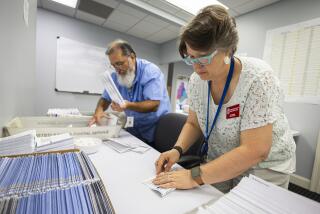A vote of confidence
- Share via
Is california Secretary of State Debra Bowen an out-of-control state official whose unwarranted fear about the security of electronic voting machines caused her to make a rash decision Friday to decertify voting systems in 39 counties and send California’s presidential primary into turmoil? Or is she a heroine who has saved California from the specter of “hacked” elections and whose only fault is not going far enough in barring all electronic voting machines?
In truth, Bowen is neither the overzealous bureaucrat that county election officials have painted her as, nor is she the savior of American democracy, as some voting reform advocates have claimed. Instead, she has made a reasonable decision about how to reform the state’s system for conducting elections, in light of voters’ concerns about the security of electronic voting equipment and given the system of overlapping federal, state and local control of federal elections.
Here’s the relevant background. County officials have the main responsibility for conducting elections in California. The secretary of state has some oversight powers, including the ability to certify and decertify equipment used for the casting and counting of ballots. State law requires that decisions to decertify any system must be made at least six months before an election. Federal law also imposes certain requirements for conducting federal elections, including the one that each polling place must have at least one voting method that is accessible to the disabled.
Bowen, who ran on a platform of skepticism about electronic voting, contracted with University of California computer scientists and others to conduct a “top to bottom” review of state voting systems. She found vulnerabilities in electronic systems used in a number of counties that could allow vote totals to be changed. On that basis, she decertified their use in the presidential primary. She will recertify the use of a single electronic machine per precinct -- to satisfy federal law -- to accommodate the disabled if manufacturers make certain security improvements.
Los Angeles’ InkaVote system was also decertified, but only because the machine’s manufacturer did not submit it for testing in time. After a review, there is a good chance it will be recertified for use in the presidential primary.
Critics who claim that Bowen’s testing of the electronic equipment was unfair have a point. The tests were done under unrealistic conditions, assuming that election officials would take no defensive measures to prevent hacking. And, of course, other systems are hackable too. As professor Thad Hall of the University of Utah has noted, in a paper-based election, literal stuffing of the ballot box with extra ballots is a form of hacking.
But such criticism misses the main point. Large segments of the public have lost confidence in the security of electronic voting systems. Although we may trust our county election officials (who generally have stellar reputations), the fear is that electronic voting machines might be hacked without the knowledge of these officials. You can’t stop ballot-box stuffing you don’t see.
The upshot of Bowen’s actions is that most counties will probably move to “optically scanned” ballots (the kind filled out with a No. 2 pencil). Optical scans are a good alternative, though they are no panacea. Voters are familiar with such forms, and they leave a paper trail. But we may see more voter errors than with electronic systems. Indeed, when San Diego was forced to abandon its electronic system for an optical scan a few years ago, thousands of voters did not know how to properly cast a write-in ballot, likely affecting the outcome of the city’s mayoral election.
Now, more than six years after the Florida debacle that had the fate of the presidency depending upon how to count a “hanging chad,” we are still debating the best way to cast and count votes. Bowen’s decision was a reasonable option for moving toward a fair system that will keep the public’s trust.
Richard L. Hasen is a professor specializing in election law at Loyola Law School.
More to Read
Get the L.A. Times Politics newsletter
Deeply reported insights into legislation, politics and policy from Sacramento, Washington and beyond. In your inbox three times per week.
You may occasionally receive promotional content from the Los Angeles Times.










